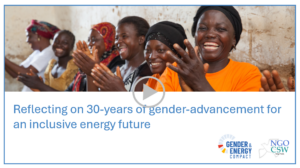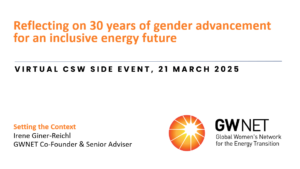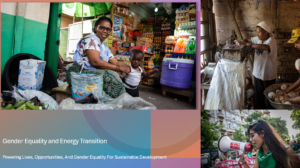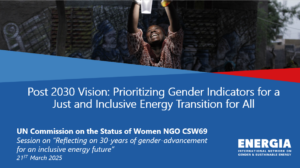As part of the 69th session of the Conference on the Status of Women (CSW69), which celebrated 30th anniversary of the Beijing Declaration and Platform for Action, the Gender and Energy Compact hosted a virtual session, examining the progress made and discuss the consistent challenges in achieving gender equality in energy access.
Keynote speeches and expert insights
Several distinguished speakers provided insights into the challenges and opportunities in achieving gender equality in the energy sector. They emphasized the importance of inclusive policies, financial investments in women-led energy initiatives, and capacity-building programs to bridge the gender gap.
In her welcome speech, Rana Gonheim, Chief of the Division of Energy and Climate Action at UNIDO, stressed that women’s participation in clean energy transitions is not just a matter of equity but also a necessity for sustainable development. She cited recent data indicating that organizations with greater gender diversity tend to achieve better innovation and economic performance.
Irene Giner-Reichl, Senior Advisor of the Global Women’s Network for the Energy Transition (GWNET) shared successful case studies where mentorship and leadership programs have empowered women in the energy sector. She underscored the need for sustained efforts in education, skills training, and networking opportunities to enable more women to enter and excel in this field.
Elizabeth Cecelski, co-founder, chair Advisory Group and senior policy adviser to ENERGIA, elaborated on the need for sex-disaggregated data and the inclusion of gender indicators for energy in a post-2030 framework.
Panel discussion: Overcoming barriers
A diverse panel of experts engaged in a thought-provoking discussion on the systemic barriers that women face in the energy industry. Key topics included:
- Financial Challenges: Women entrepreneurs in clean energy still face difficulty accessing funding and investment.
- Policy Gaps: While some policies support gender inclusivity, implementation remains inconsistent across regions.
- Representation and Leadership: There is a significant underrepresentation of women in leadership roles within energy organizations and institutions.
- Workplace Culture: Biases and gender stereotypes continue to hinder women’s professional growth in the energy sector.
Panelists proposed various solutions, such as increasing targeted funding for women-led energy projects, enforcing gender-responsive policies, and fostering inclusive workplace cultures that promote mentorship and sponsorship of female professionals.
Audience engagement
Participants actively engaged in the discussion by submitting questions via the chat function. Questions ranged from practical strategies for young women entering the energy sector to policy recommendations for governments looking to promote gender equality in energy leadership. Panelists responded with actionable advice, emphasizing the importance of partnerships, advocacy, and personal empowerment.
Closing remarks and key takeaways
The session concluded with a summary of key takeaways by Martin Niemetz, Sustainable Development Expert on Energy of UN DESA:
- The need for stronger policies that actively support women in energy.
- Increased investment in capacity-building and leadership programs for women.
- The importance of mentorship networks in fostering women’s career growth.
- The role of multi-stakeholder collaboration in driving change.
Attendees were encouraged to stay engaged with the Gender and Energy Compact and participate in future events to continue the conversation.
Final thoughts
This session reinforced the critical role of gender inclusivity in shaping a sustainable energy future. The discussions provided valuable insights and actionable steps to break down barriers and promote equal opportunities in the energy sector. With continued collaboration and commitment, meaningful progress toward gender equity in energy can be achieved.











